On a cold night on April 26, 1957, a member of the Nation of Islam, Hinton Johnson, witnessed fellow Nation of Islam members being beaten by police. Outraged by what he was witnessing, he intervened, which resulted in him beating brutally beaten…
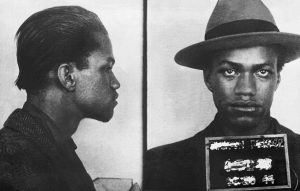
Malcolm Little was recently released from prison on a robbery charge. In prison, he had converted to Islam. Malcolm replaced his surname to “X” (a custom among Nation of Islam members who believed that their surnames had originated from slave owners), and shortly after joining the Nation of Islam, he gained the attention of Elijah Muhammad.1 Elijah Muhammad was the leader of the Nation of Islam, a self-proclaimed messenger of Allah, and a black separatist; and he was Malcolm X’s mentor. The Nation of Islam was an African-American movement that emphasized black nationalism and racial pride when Malcolm X joined.
Malcolm X began organizing temples for the Nation of Islam and started publishing a newspaper that spread the message that blacks were superior, and all whites were naturally evil. Malcolm became the minister of two temples, No. 11 in Boston, Massachusetts and No. 7 in Harlem, New York. No.7 was the largest and most prestigious temple in the Nation of Islam, after the Chicago headquarters. After gaining a reputation, Malcolm X was named the National Representative of the Nation of Islam.2 By 1952, Malcolm X had begun preaching his message of black superiority, and of his dislike of the mainstream civil rights movement. Malcolm X’s ideology for combating racism was for getting even, and he advocated for Black people to defend themselves. He gave a speech at the founding of the Organization of Afro-American Unity in 1964, stating “We declare our right on this earth to be a human being, to be respected as a human being, to be given the rights of a human being in this society, on this earth, in this day, which we intend to bring into existence by any means necessary.” Malcolm X’s goal was to get even, even if it brought violence.3 He believed that African Americans should band together and create their own society and be proud of their race.
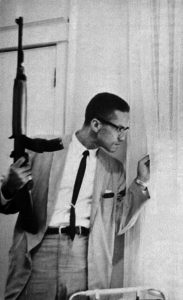
Two American journalists, Louise Lomax and Mike Wallace, who covered controversial topics, wanted to produce a television documentary about the Nation of Islam. Lomax approached Malcolm X looking to get approval, but Malcolm X redirected him to Elijah Muhammad.4 Muhammad questioned Lomax and spoke to his concerns, but gave Lomax and Wallace his approval to go forward with the show. For the next couple of weeks, the film crew recorded many of the Nation of Islam’s ministers and their teaching their black audiences the “truth” about black superiority and the “devil white man.”
The turning point in Malcolm X’s career was on April 26, 1957, an unexpected incident occurred. In New York City, two white police officers were on duty trying to break up a fight between some African Americans, but they were using unnecessary force. There was a crowd that had gathered around the altercation, and both police officers ordered the crowd to disperse and go away. Two of the bystanders were a part of the Nation of Islam and did not listen to the officers, which then led to the officers beating one of the members that refused to leave, brother Johnson Hinton. The officers had split Hinton’s skull open and arrested him, providing him no medical care.5 The other member quickly called Temple No. 7’s restaurant and explained the situation. Malcolm X and some fifty members joined him in a march to the police precinct and stood outside in ranks, in a disciplined formation. More African Americans gathered around and soon the crowd grew to more than 100 people. Malcolm X walked into the station and demanded to see brother Hinton. The officers lied and said that he was not at the station, only later admitting that he was. Malcolm X threatened the officers that if brother Hinton did not receive medical care, then the Nation of Islam members outside would remain there until justice was done. Malcolm X then told the lieutenant in charge “That man belongs in the hospital.”6 An ambulance was called and brother Hinton was taken to Harlem Hospital, and the crowd followed, with people watching from inside stores and restaurants, joined the crowd; and the crowd quickly grew to more than 4000. This was the first time that African Americans had taken a stance against police brutality in Harlem. Standing outside the hospital, members of the Nation of Islam stood in front of regular citizens who joined the crowd, and the police quickly felt threatened and told Malcolm X to disperse the crowd. Malcolm X responded with “our brothers are standing peacefully, disciplined perfectly, and harming no one.”6 Doctors assured Malcolm X that brother Hinton was receiving medical care and would recover. Malcolm then gave a hand signal to all the Nation of Islam members, and the crowd dispersed. Captain Green said a famous line that has stuck with history forever, “That’s too much power for one man to have.”
After brother Hinton was released, the Nation of Islam helped him sue the police for police brutality. Hinton Johnson was ultimately awarded over $70,000 in the settlement, and it made history by being the largest police brutality judgment that New York City had ever paid. Many newspapers wrote pieces about the event, and soon the Black Muslims were being recognized by New York City. The way the event was written in The New York Age, blame was placed on the African Americans involved in the incident. There were multiple grammatical errors, and the newspaper showed little to no respect to brother Hinton for the injuries he endured.8 The event made the police force have a changed attitude toward the Nation of Islam, and from then on, they kept a close eye on them.
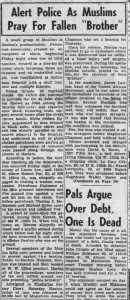
The Hinton Johnson incident showed New York City the power that Malcolm X had over the members of the Nation of Islam and fellow African Americans. This event gave Malcolm X and the Nation of Islam some attention. Malcolm decided to pursue a more active role in the civil rights movement. When the television series “The Hate That Hate Produced” aired, there was an immediate reaction from the public. Malcolm X and other ministers of the Nation of Islam had been titled “Black racists,” “Hate-teachers,” and “Violence seekers,” among other names. This drew the attention of other African-American civil rights activists, and they quickly picked sides in this fight against racism. Elijah Muhammad told Malcolm X that they should not attack the other activists so publicly, because it was one of the “white man’s tricks” to keep African Americans divided and thereby keep them from achieving unity. The other activists continued to belittle the Nation of Islam and what their goals were, so both Elijah Muhammad and Malcolm X agreed that it would make the organization look weak if they did not respond, so Malcolm X began belittling them back. With the Nation of Islam gaining fame and attention, people began making hefty contributions to Temple No. 7. With these funds, they built a school, a library, a hospital, and a museum documenting African-American history.9 Elijah Muhammad visited the temple and told members to refer to the temple as a Mosque, solidifying them as just Muslims.
Malcolm X typically did things his own way, untraditional and very spontaneous. His approach to combating discrimination was not the only thing that he did differently. His approach to marriage was unique. During his time as a minister at Temple No. 7, a new member joined, Betty Shabazz. Malcolm X said many times that marriage was not for him and that he was not cut out to be in a committed relationship. He slowly developed feelings for Betty and began thinking about marriage with Betty X. Malcolm stopped by a payphone and gave sister Betty a call, and said nothing more than “Look, do you want to get married?” and two days later, they were married. Betty X and Malcolm X stayed married and had children together.10
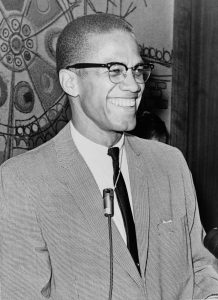
The big civil rights leaders continued to attack the Black Muslims and criticized Malcolm X’s approach to fighting injustice. Malcolm X’s vision for America was that African Americans would fight back against the “devil white man,” and that they would do to white people exactly what white people had done to black people for centuries.11 With Malcolm X’s more active role in the civil rights movement, he was being approached by journalists and interviewers. He was often asked questions in an attempt to pin him against other civil rights leaders. When Elijah Muhammad and Malcolm X stumbled upon a disagreement about the direction the Nation of Islam was taking, Malcolm X left the organization in March of 1964, and took a journey to Mecca, Saudi Arabia, where he founded his own Mosque and changed his name to El-Hajj Malik El-Shabazz.12
Malcolm X is one of the prominent civil rights leaders and is mainly known for his unique vision of what he wanted for African Americans in America.13 He was one of the only African-American civil rights leaders that traveled to Africa and witnessed life as a Muslim outside of America. Throughout his autobiography, one can see a shift in his view towards African Americans; he would use derogatory and discriminatory terms, but realized the harm he was causing, so he began referring to African Americans as “The American black man.” He stated that his journey outside the United States broadened his view of other races. “I shared true, brotherly love with many white complexioned Muslims who never gave a single thought to the race, or to the complexion, of another Muslim.”14 Malcolm X wanted a society that eliminated the thought of race and could co-exist peacefully.
- Malcolm X, Alex Haley, and Attallah Shabazz, The Autobiography of Malcolm X: As Told to Alex Haley, Reissue edition (Ballantine Books, 1992), 112. ↵
- Malcolm X, Alex Haley, and Attallah Shabazz, The Autobiography of Malcolm X: As Told to Alex Haley, Reissue edition (Ballantine Books, 1992), 131. ↵
- Malcolm X, Alex Haley, and Attallah Shabazz, The Autobiography of Malcolm X: As Told to Alex Haley, Reissue edition (Ballantine Books, 1992), 4. ↵
- Malcolm X, Alex Haley, and Attallah Shabazz, The Autobiography of Malcolm X: As Told to Alex Haley, Reissue edition (Ballantine Books, 1992), 151. ↵
- Malcolm X, Alex Haley, and Attallah Shabazz, The Autobiography of Malcolm X: As Told to Alex Haley, Reissue edition (Ballantine Books, 1992), 150. ↵
- Malcolm X, Alex Haley, and Attallah Shabazz, The Autobiography of Malcolm X: As Told to Alex Haley, Reissue edition (Ballantine Books, 1992), 151. ↵
- Malcolm X, Alex Haley, and Attallah Shabazz, The Autobiography of Malcolm X: As Told to Alex Haley, Reissue edition (Ballantine Books, 1992), 151. ↵
- “Johnson Hinton Incident,” The New York Age, May 4, 1957, https://www.newspapers.com/clip/18584420/johnson-hinton-incident/. ↵
- Malcolm X, Alex Haley, and Attallah Shabazz, The Autobiography of Malcolm X: As Told to Alex Haley, Reissue edition (Ballantine Books, 1992), 168. ↵
- Malcolm X, Alex Haley, and Attallah Shabazz, The Autobiography of Malcolm X: As Told to Alex Haley, Reissue edition (Ballantine Books, 1992), 148. ↵
- Malcolm X, Alex Haley, and Attallah Shabazz, The Autobiography of Malcolm X: As Told to Alex Haley, Reissue edition (Ballantine Books, 1992), 154. ↵
- Robert E. Terrill, “Radical Judgment,” in Malcolm X, Inventing Racial Judgment (Michigan State University Press, 2004), 109. ↵
- Robert E. Terrill, “Radical Judgment,” in Malcolm X, Inventing Racial Judgment (Michigan State University Press, 2004), 109. ↵
- Malcolm X, Alex Haley, and Attallah Shabazz, The Autobiography of Malcolm X: As Told to Alex Haley, Reissue edition (Ballantine Books, 1992), 226. ↵
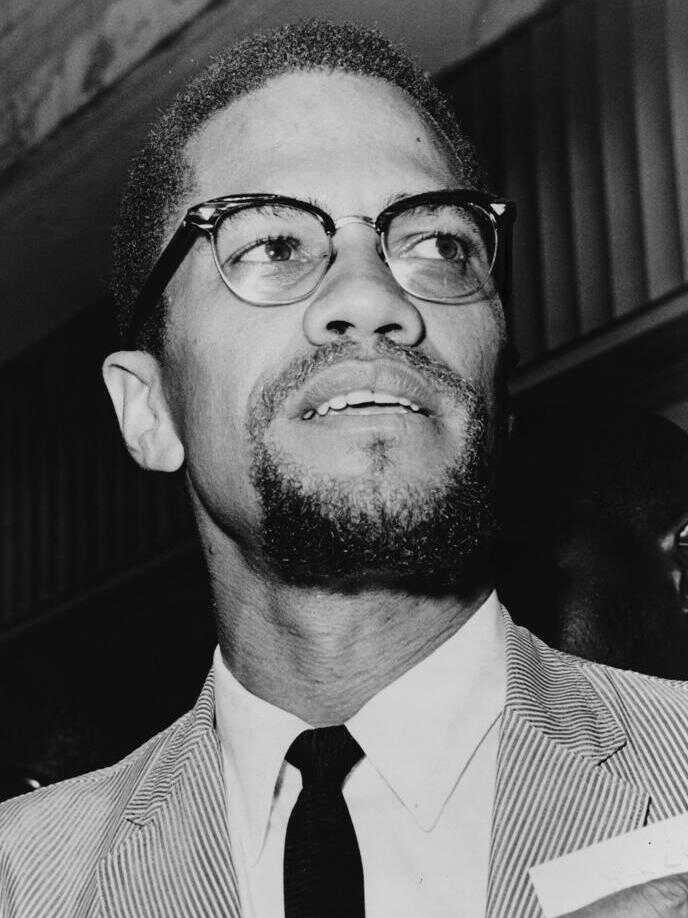
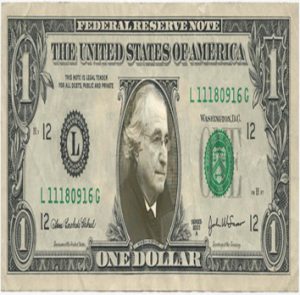

20 comments
Cassidy Colotla
Malcolm X’s life is so interesting. He was around in a time that really needed peace. To start off Amelia, I think you did such a good job researching his life and his cause. Your execution in writing skill is great i’m glad you wrote about such an important topic. I think Malcolm X was trying to find a world in where he could be treated equally and he had valiant effort in defending his cause.
Chris Ricondo
Congratulations on the nomination, and this article grabbed my attention. This Malcolm X essay is really fascinating. In your piece, you described a pivotal moment in Malcolm X’s life when he observed a fellow brother being beaten and pushed for him to receive medical treatment that had previously been denied to him.
Andrew Ponce
Despite many people having heard of Malcolm X, this article goes into depth on this character in a way that still keeps the reader engaged and wanting to read more. Rather than only talking about the famous aspects of Malcolm X, the author also targeted aspects that were less popular, which gave the reader not only new knowledge on the character, but kept the article interesting and educational. Great job on the article and the nomination!
Elizabeth Saxon
Congrats on the nomination!! This article was very informative. It amazes me how someone can live such an impactful life. I also didn’t realize how he was in prison. He transformed his life completely to be the leader of the Nation of Islam. Truly such an inspiring story. I actually had no idea that he believed in some of the things he believed in. This was all around a very well-written article!
Phylisha Liscano
Hello Amelie, congratulations on the nomination for best in american history. This was a great article and I enjoyed getting the chance to read your article. I had very little prior knowledge of Malcom X but your article gave me the information I needed. I can tell you did lots of research for your article. This was a very formative and interesting article.
Vianne Beltran
Hi Amelie,
I found your article really interesting to read as Malcom X is a prominent historical figure that I haven’t actually learned much about. I knew he had a more violent dogma and methodology than MLK and other civil rights activists but I never knew exactly what his beliefs entailed. It’s interesting that him leaving the United States broadened his perception of other races.
Matthew Gallardo
This article was great to read! I only knew a small bit about Malcom X, not what caused him to come to the public eye. I also did not know that Malcom X was a prime factor in the first show of resistance against police brutality in Harlem. THis is very well written, and the use of the quote “we declare the right on this earth to be a human being…” was powerful. I’m very glad I read this article.
Paula Ferradas Hiraoka
Hello Amelie,
First of all, congratulations on your nomination and getting your article published!
At first, I didn’t knew who Malcolm X was, but after reading your article (which is amazing), I learned who was him and the Nation of Islam and Malcolm’s role in it. I really like how you explained Malcolm’s life and the transition of his life also, to be in prison to a leader of the Nation of Islam is a huge change.
Overall, great work and good luck!
Cecilia Schneider
I absolutely loved reading this article! It is very inspiring to see such a drastic change in Malcolm X’s life. From prison to a leader of the Nation of Islam (and so successful in this), to someone who again changes and accepts new views. To want to respond to violence and hate with violence and hate is a very human response. To inflict pain on those who inflicted pain on you is something that we all experience individually. Malcolm X, however, observed and felt the black community’s pain, which carries much more weight than an individual’s pain. To fight for others who suffered is a respectable and heroic notion. Though his ideas of hate towards another race may not be right, it is understandable to have the view of the “white devil.” I say this because, in the end, Malcolm moved from the idea of fighting back against whites to understanding the need to end all racism and accepting all. This story brings to mind the idea of “fighting fire with fire.” We understand this and for this, I feel that Malcolm X’s idea of racism against whites was not the way to successfully end the racism that African Americans endured.
Madison Goza
I didn’t know much about Malcom X going in, but I learned a tremendous amount about him and the Nation of Islam through your article. In your article, you articulated a very clear turning point in the life of Malcolm X as he witnessed the beating of his fellow brother and advocated for his receiving of medical treatment that had been previously denied to him. Very well-written and researched! Great job!